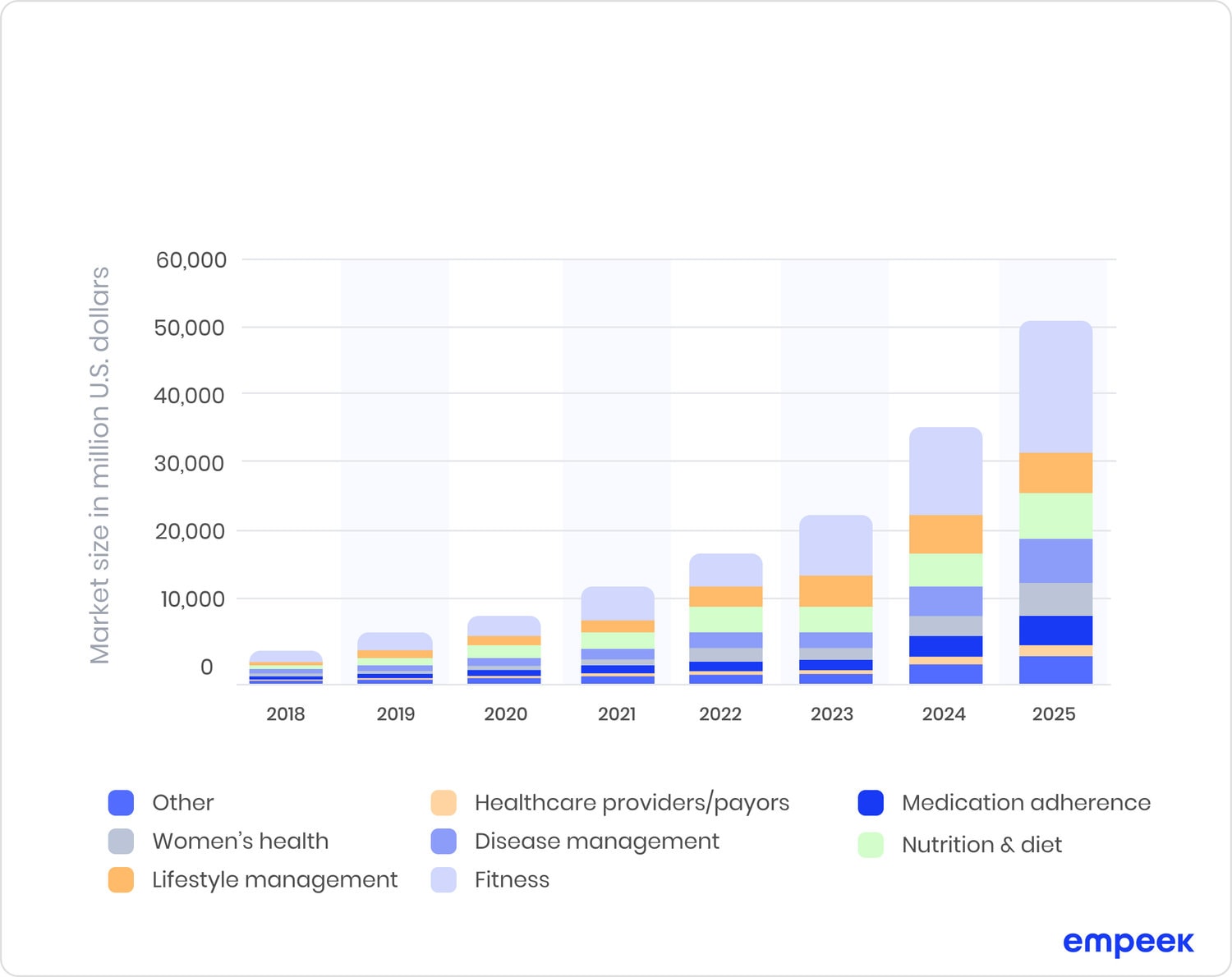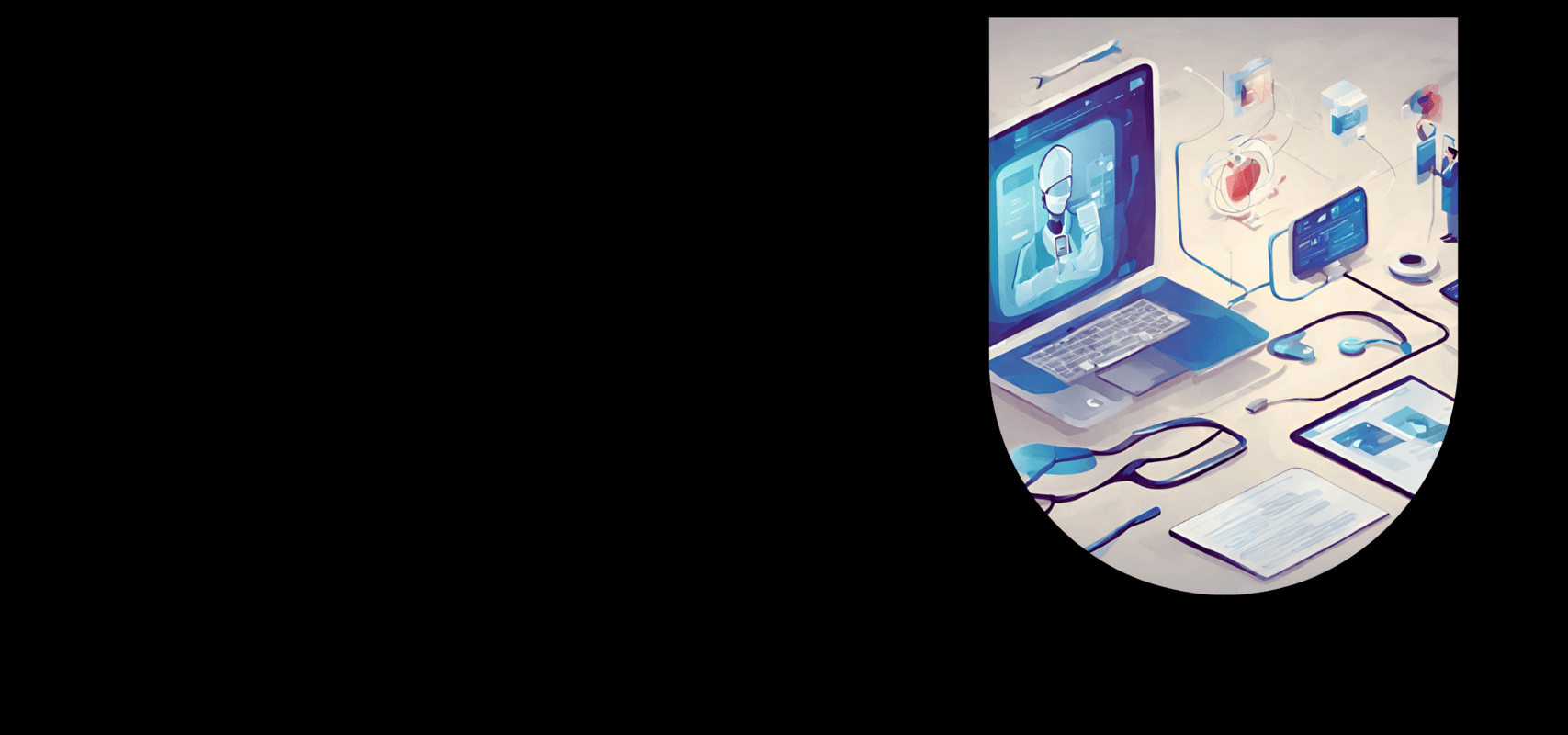The prevalence of mobile devices makes the mHealth market grow to reach 189 billion USD in 2025. Providers adopt solutions like patient portals and multi-functional mobile apps to stay in touch with patients and provide them with better services.
mHealth adoption trends for provider-patient engagement enable healthcare organizations to connect with patients more efficiently, collect valuable health information, and reap other benefits we’ll discuss in this article.
Keep reading to learn what mHealth patient engagement tools to adopt, why you need them, and how Empeek can help with implementation.
mHealth Patient Engagement: The Real Impact of Mobile Solutions
Years ago, people had to go to medical facilities and wait until a doctor freed up to help them. It was tiring and could have taken half of their working day. It discouraged people with health problems from visiting healthcare organizations and adversely affected the quality of care.
The spread of mobile devices has changed the rules of the game. With mHealth patient engagement technology, patients no longer need to visit healthcare specialists in person. They can collect health information remotely and connect with a therapist at a previously agreed time online.
There used to be common disbelief that mobile healthcare services are far less beneficial than face-to-face consulting, but they aren’t. The increasing usage of mobile health solutions has shown they help with effective mHealth patient engagement. 90% of physicians use smartphones at work. 58% of patients like to message their healthcare providers through smartphone apps, and 47% use apps for health monitoring. 74% of patients claim that wearables and other mHealth tools help them manage their conditions.
Hence, mobile solutions of all kinds are a great way to bridge patients and healthcare providers to enhance patient engagement in healthcare. When people can access care at any time, they also become more likely to tap into online healthcare capabilities and get personal devices for health monitoring.
Are You Sure That The Technology Your Company Is Using Doesn’t Hamper Business Growth?
Talk To An Expert5 mHealth Patient Engagement Tools to Adopt in Your Practice
According to the Global Market Insights report, applications are the leading segment in the mHealth market with a 23% share. Apart from mHealth and patient engagement apps, providers also adopt tracking wearables, monitoring systems, patient portals for quick data access, and other mHealth solutions.
#1. Fitness trackers
Even though fitness trackers are not primarily intended for medical use, they can collect valuable health information and boost patient engagement. The user monitors the number of burnt calories, heart rate, steps, and other details to share them with a healthcare team. It allows clinicians to personalize the treatment and cooperate with the patient more closely.
#2. Patient portals
Digital web or mobile portals are essential to improve mHealth patient engagement. When the person can check their health record, contact the healthcare organization, download reports, and conveniently complete many other healthcare routines, they more willingly interact with the provider.
#3. Monitoring equipment
Modern wearables like blood glucose monitors, blood pressure cuffs, pulse oximeters, or cardiac care mobile devices reduce the workload on medical teams and make patients more independent from hospital-based treatment. People can go on with their lives while using health monitoring wearables.
#4. Mobile apps
As we have already mentioned, an mHealth app is the most common form of mHealth patient engagement solutions. Users usually get apps to stay fit, follow their nutrition plans, and control disease management. Medication adherence, women’s health, mental health app support, and communication with a healthcare provider are other common uses. Since mobile apps are so popular, adopting one for your healthcare practice or investing in mobile software development is a great idea.
The US mobile health apps market forecast by app type

#5. Medication management systems
These solutions provide clinicians and pharmacists with a detailed view of a patient’s medication history regardless of their physical location. A pharma app facilitates patient interactions, reduces medication errors, and enhances medication adherence.
How mHealth Patient Engagement Technology Helps to Keep Patients Informed and Active
If you want to invest in mHealth app development, the best approach is to launch custom software. Then, the tech capabilities will perfectly match your operational needs and patients’ expectations.
Here are the main ways to leverage tech capabilities for patient engagement.
Keep patients updated with reminders and notifications
Remind people about upcoming appointments, medications, and other crucial steps they need to take. You can do it through a mobile app, software for smart speaker systems, or automated calls/SMS messages. Such alerts will nudge patients into taking the necessary action.
Send patient information to mobile devices
Easy data sharing is the primary implication of patient engagement to mHealth. With patient portals and handy mobile apps, users can access their treatment details anywhere. It eliminates the unnecessary interactions between healthcare teams and patients, improving the quality of engagement.
Adopt telemedicine services
Telemedicine solutions are web or mobile apps that enable patients to talk with their doctors in real-time online. This way, they can discuss symptoms, treatment options, and plans remotely. The best thing about telemedicine is that it allows people who live in remote locations to engage with healthcare providers as easily as if they were able to visit them.
Monitor patients remotely
Wearables powered with high-end technology can gather valuable information about a patient’s health. The person doesn’t have to stay in the hospital while medical professionals track their wellbeing.
Give people more impact on treatment decisions
With the availability and convenience of patient information sharing, people can track what’s happening with their treatment. It helps improve mHealth patient engagement and encourages people to inform the medical team if they have any concerns about their health.
Jumpstart Your Project With Empeek
Contact UsWhy mHealth Patient Engagement for Providers is a Top Priority
While it may seem like mHealth adoption trends for provider-patient engagement dominate the market, not everyone has an mHealth patient engagement strategy. Many providers only start the transition to more mobile healthcare services. Over the next five years, the mHealth app market will grow at a 17-18% rate annually, uniting more and more companies.
It means that those who fail to make their systems mobile will lose to healthcare organizations that have already done it. Besides, the implementation of mobile systems provides tangible business benefits. For example, the Capital Blue Cross study showed that remote patient monitoring devices for tracking heart failure patients cut hospitalization by one-third, saving over $8,000 per patient.
If you are not a healthcare provider but want to invest in mHealth patient engagement tools, you can also capitalize on the growing market demand. Some hospitals are not ready to invest in custom patient engagement using mHealth solutions and readily purchase ready-made systems. Yours may be one of them.
Improve mHealth Patient Engagement with Empeek
Empeek is a software development company with a focus on healthcare solutions. Since most of our projects are for healthcare, we know that reliability, compliance, and ease of use are essential for any medical app. The Empeek team has experience developing many systems, from telehealth apps to health monitoring systems and ECG device software. Check the complete portfolio with our projects here.
Empeek hires an in-house team of software engineering specialists with relevant experience ready to take up your project. Thanks to this, we can assemble a dedicated team for you within the shortest time or provide outstaffing services.
Contact us now to discuss your technical and business needs.








